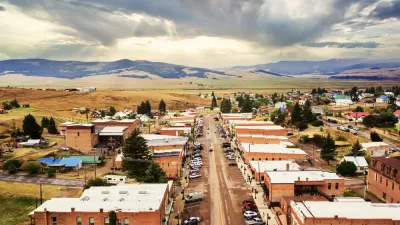A boomtown in the desert that was expected to grow in population to more than 350,000 by 2020 is going bust, and putting things in perspective as the economy dives and foreclosures spread.
"The town of Maricopa, which isn't part of the nearby county of the same name, is about 30 miles south of downtown Phoenix and is separated from the city by an Indian reservation that remains mostly desert."
"But Maricopa's fate is closely tied to that of the Phoenix metro area, where billboards tout foreclosure auctions and bankruptcy lawyers. Largely because of a plunge in construction and related fields, employment in the metro area shrank 4.5% last year, steeper than the national drop of about 2%, says Lee McPheters, an economics professor at Arizona State University. One consolation, he says, is that the steep drop in home prices and low property taxes compared with California and Midwestern states eventually could bring in a new wave of residents to revive the local economy."
"Now, Maricopa will do well just to grow its population gradually for a few years. In 2005, consultants hired by the town projected that the population would reach 350,000 by 2020. City officials no longer see that as realistic. The real estate bust "will make for a more sane [pace of] growth," says Mayor Anthony Smith. He points out empty spaces that could be occupied by parks or a community college."
FULL STORY: In Maricopa, Ariz., a Paradise Found and Lost

Planetizen Federal Action Tracker
A weekly monitor of how Trump’s orders and actions are impacting planners and planning in America.

Maui's Vacation Rental Debate Turns Ugly
Verbal attacks, misinformation campaigns and fistfights plague a high-stakes debate to convert thousands of vacation rentals into long-term housing.

Restaurant Patios Were a Pandemic Win — Why Were They so Hard to Keep?
Social distancing requirements and changes in travel patterns prompted cities to pilot new uses for street and sidewalk space. Then it got complicated.

In California Battle of Housing vs. Environment, Housing Just Won
A new state law significantly limits the power of CEQA, an environmental review law that served as a powerful tool for blocking new development.

Boulder Eliminates Parking Minimums Citywide
Officials estimate the cost of building a single underground parking space at up to $100,000.

Orange County, Florida Adopts Largest US “Sprawl Repair” Code
The ‘Orange Code’ seeks to rectify decades of sprawl-inducing, car-oriented development.
Urban Design for Planners 1: Software Tools
This six-course series explores essential urban design concepts using open source software and equips planners with the tools they need to participate fully in the urban design process.
Planning for Universal Design
Learn the tools for implementing Universal Design in planning regulations.
Heyer Gruel & Associates PA
JM Goldson LLC
Custer County Colorado
City of Camden Redevelopment Agency
City of Astoria
Transportation Research & Education Center (TREC) at Portland State University
Jefferson Parish Government
Camden Redevelopment Agency
City of Claremont





























